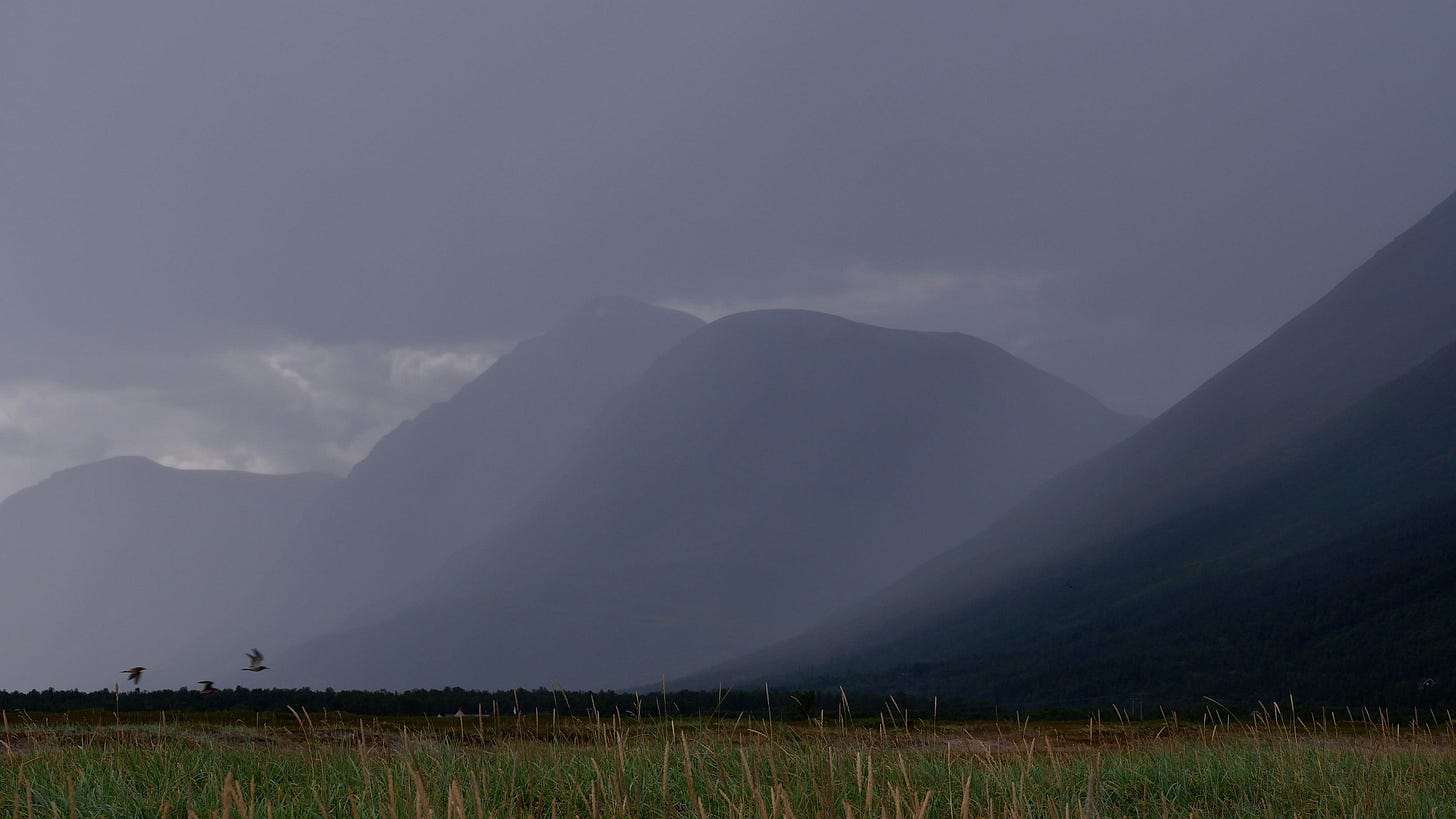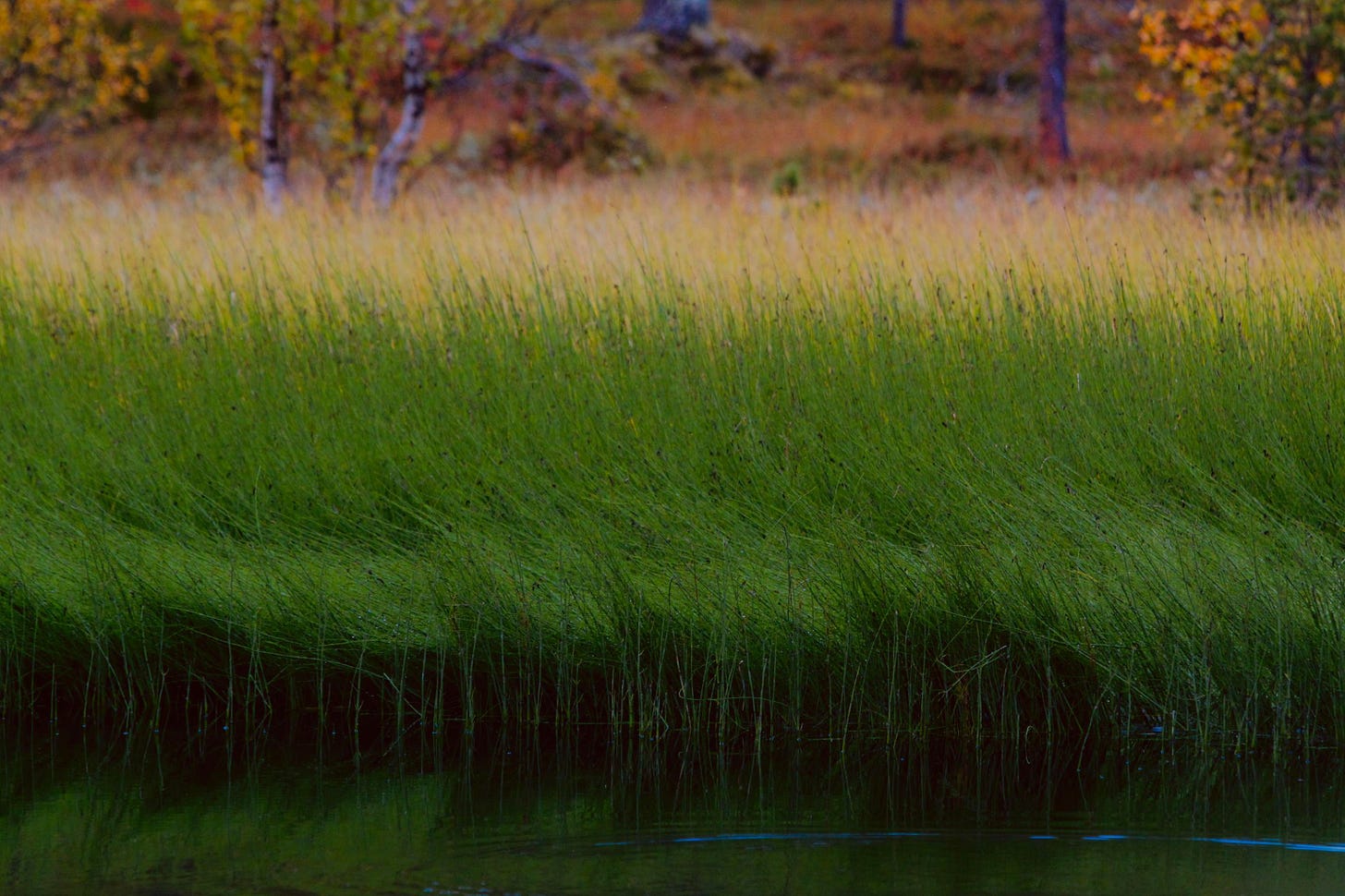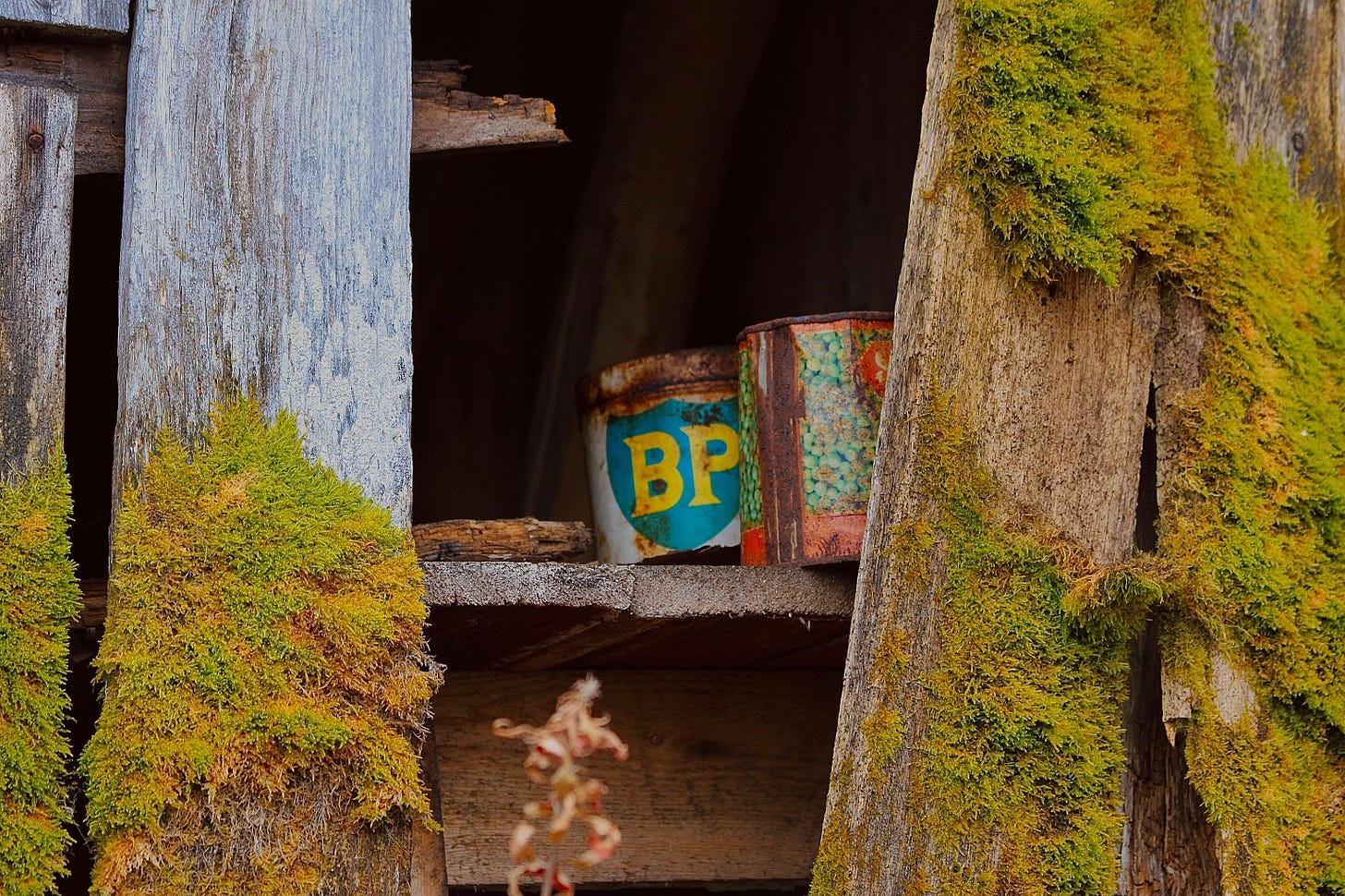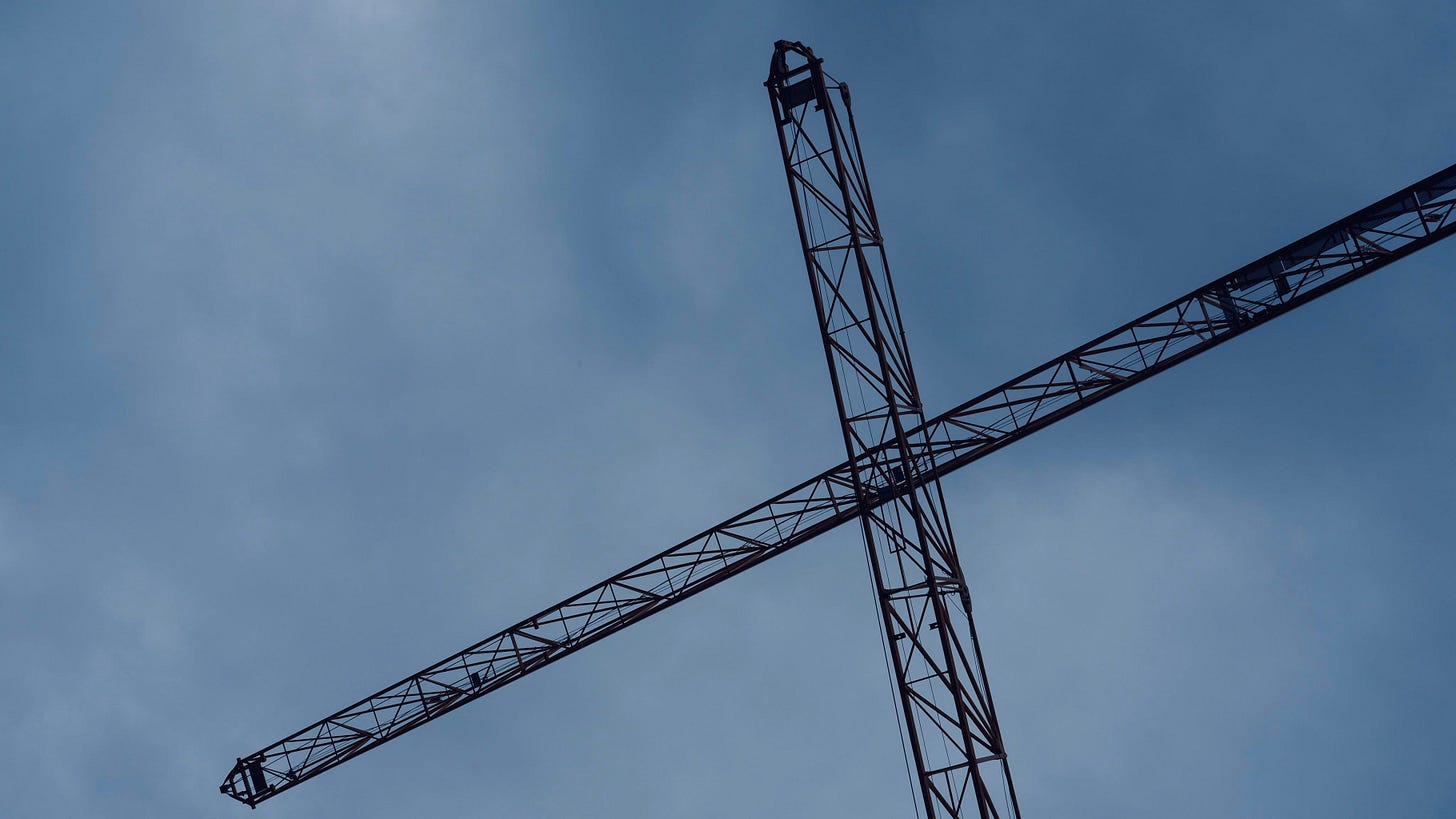Come around when you can
I caught the scent of woodsmoke while out walking one evening. Now suddenly it is easier to be in love and to be in love with what is here.
It was a couple of nights ago that I went over to Espen’s house. I was bringing him an attic door and a tin sink. I didn’t need the door or sink anymore, but they were good as new. After we unloaded the door and sink into Espen’s garage, he and I visited. We caught up on each other’s lives. Lives here can disappear in a summer. We head for the hills or for another country in the summer months, while in winter, we vanish into our own homes. As Espen and I talked, rain fell outside. This was our first strong rain since June.
Espen held up two fingers. “Two months of perfect weather. Perfect summer.”
It was true, too. The summer had been perfect. No one I spoke with had experienced a summer like this one. Many days were warm. Some days approached hot. The sun never stammered.
“In the south it flooded. In Spain and England” Espen spread his arms out, “it burned.”
The rain went on falling. I worried about keeping Espen from his wife and young daughter. I don’t spend a lot time in other people’s homes. Most households have set routines. Espen is a carpenter and goes to work early. He and his father have done work on my old house. They keep the old house, Tunheim, standing. I am grateful for that. That’s part of what we talked about, the old house and the weather, and the weather was changing.
Four days ago snow dusted the top of the mountains across the sund. I noticed that the hills had started to change colors. The groundcover changes first, not the trees. The trees will change later, maybe in another two or three weeks. But the groundcover changes first—the blueberry and bilberry bushes, lupine, fireweed, heather, shrubs and grasses whose names I do not yet know. Warm shades of scarlet, lavender, burnt orange and yellow gold signal the turning of the season. Those of us who notice such changes stare differently at the hills this time of year. They are more beautiful now. We can almost convince ourselves that we are seeing them for the first time. And in a way, we are, but doesn’t that happen with every season here. This year spring was wet, muddy, grey, and hesitant until there was a burst of hesterhov and birch leaves. Summer arrived with vibrancy, birdsongs, and growth. Every summer we are amazed at the clarity of light and the renewal of a brightness that left the world, yet the light returns and the countryside warms under the hours of constant sunlight. It hardly rained this summer, but around the first of September, the rain and autumn arrived. Clouds filled the valleys. Evenings cooled. I caught the scent of woodsmoke while out walking one evening. Now suddenly it is easier to be in love and to be in love with what is here.
Many of us travel away from the north in summer. This has been the pattern until more recently, more recently being since COVID. Most of us travel in late June or July to a much warmer climate. We go to Italy, to Spain, to Crete, to Portugal. At the end of July, I was on a plane, flying with my family, to a Greek island. The island is clustered into what Lawrence Durrell refers to in his book, The Greek Islands, as “The Home Group.” We have traveled to this island on three occasions. People tell us there are other islands to see, to experience, and I believe them, yet I am not seeking another island. We go there and establish our routines. For myself, I write-eat-sleep-swim-eat again-and then sleep again. I maintain this routine for as long as we are on the island. The sun is serious in Greece. The streets are hot. Color has been baked out of the landscape. Old men drink coffee early in the morning at the port, and some of the old men speak with cats. When I am on the island, I wish for rain. I wish for rain not simply to cool the temperature or to relieve us from the sun, but I desire to know what the island smells like after a rain. Picture a dusty Greek island with pines sweating in the hills and oleanders thirsting beside the sea. Thunder rolls across the Aegean, and you can imagine it touching the other islands as it approaches you. Lightening slices through the clouds. There is a wind followed by an unexpected calm. Then the rain falls. Gods would be summoned in an instant.
But summer days in the north—if we get summer days, instead of a summer day here and there—pass quickly. Tabby Ivy and her friend Anne came to visit in July. Anne is Norwegian by way of the United States. Her parents, I believe, immigrated to the Northwest. She travels to Norway around six times a year. She works here. She has family here. She knows the country and its people intimately. And yet she maintains a curiosity about this place, asking for the names of mountains, of fjords, of villages, and then locating those places on her maps. But for Tabby, this was her first trip to the north. After years of Tabby and me sharing emails about this place, after assembling Between Artists, after an exhibition that included Tabby’s paintings of the landscape here, as well as her own Montana, she arrived. Tabby Ivy was in the north. She saw some of the places she has painted. We told stories. We ate finnbiff. We walked in the hills behind my house and found an area where multebær were soon to bloom. We had coffee and waffles with Stein Erik and Edmund Georg and afterwards walked around Stein Erik’s yard where his wife showed us plants and shrubs thriving under the sun. We hiked to the top of a hill on a neighboring island to see other islands peppering the hav. Then on a warm morning, with the sun already over the mountains and the sea as calm as a backyard pond, Tabby and Anne took a boat southward to see other fjords, other villages, other days of midnight sun. Someday I hope Tabby and I will find ourselves at a table, with a couple of stems of wine before us, and we will tell stories of that time she made a trip to the north.
Days were not hurried on the Greek island, though they ended, as the always seem to end, much too soon. The trip from Greece to the north is one I have made on a few occasions. The difference with this most recent trip is that when we landed in the north, we landed in a warm climate. I do not suppose a person can appreciate what this is like unless they have lived someplace extreme. Imagine leaving the Rockies in late May and landing in southern Louisiana. Or, as it happened here one April, I went from an English countryside where the daffodils were in bloom back to the north where I stepped from snowbank to snowbank over the four-foot tall gate that leads onto our property. So we left the Mediterranean and returned to our home well inside the Arctic Circle, where, upon arrival, we saw women wearing halter tops and men who should have known better wearing shorts. Driving home from the airport, I stared at the mountains and the fields, shaking my head as I did, questioning why it was so warm. I was not alone in this. People who have lived here all of their lives were confounded by the heat. The yard at Tunheim was parched. The plants needed watering. Yet no one was complaining. We take sunlight and warm days whenever we get them. We do not gripe about warm days here. We know what is coming.
After returning from Greece, I was home for two days before heading to the far north with Tore. Tore and I were going fishing. Tore brought along enough equipment to open a restaurant. I brought a dry bag filled with camping gear and a shoulder bag stuffed with notebooks and books. We spent a couple of nights at Hildur’s hytta. Hildur, who I think is Tore’s aunt or maybe his cousin, said she had to stay in town, but we were welcomed to stay at her cabin. I could happily die at Hildur’s hytta. I slept deeply and easily among her collection of knives, drift wood, porcelain sailors and ships, fishing nets, a woodstove, kettles, and a radio Tore tuned to a jazz station. One night I woke up to pee, and I peed from the second floor window overlooking a hay crop where a herd of reindeer had settled for the night. This is the good life. Tore and I picked multebær and ate Thai food. One of his uncles, and Tore must have 14 uncles, married a Thai woman who happens to be a very good cook. We left the hytta and drove two hours south to meet up with Ruben and Stein Viggo. Ruben and Stein Viggo are brothers and also Tore’s nephews. They had set up a camp along a lake and were waiting for us. They were anxious to pursue serious fishing. They had a boat, rods, coolers, nets. We fished and fished for the first couple of days, but the fish were not biting. It was too warm. The water was too warm. With hot days and too hot to fish, we sat around camp and told stories. I made lists, including a word list to expand my limited Norwegian.
From my notebook: *
bol - living place for mice or small mammals, wasps or snakes.
slott - a castle. (slotte or slottet = the castle)
havørn - sea eagle.
napp - to get a bite when fishing or, euphemistically, to get a woman, to get laid.
røkte garn - check the net.
marbakke - sea shelf
mare – a nightmare, which can also be used to describe an annoying person, often a female.
lik - to “like” someone but also the same word is used for “body,” specifically a dead body.
rev - fox or euphemistic for ass, as in “that dokka has a nice rev” (or something like that).
dokka – old slang for an attractive woman.
næver - the outer bark of a tree, which I the best fire starter.
hail – to have good sex the night before fishing so you might have good fishing. To get good fishing luck.
Near the top of the world, too hot to fish, four men, two dogs, beer, and no schedule, we took pleasure in doing mostly nothing, though we did manage to catch a few fish and Tore harvested another bag of multe. Then one morning, after four days of tent living, we packed up and drove away to our other lives. Before driving, we made promises not to let so many months pass before the next trip. We also gave assurances that we would not mention certain stories, certain circumstances confessed across the campfire, but promises were not necessary, which is always the case with campfire talk. Although, let me say, there will be only one legend from this trip, only one jefe, and it ain’t me.
On the drive south, Tore and I stopped to take photos of a river canyon. Neither of us had stopped to see the canyon on previous drives. Tore parked the car in a designated lot where two RV’s with Finnish plates were parked. “Why do the Finns come here? They have pretty country in Finland. Don’t they have rivers in Finland?” “Not that many,” Tore said, “They have lakes.” “Lots of lakes, I guess.” Tore said, “They come for our fish.” “What do you mean?” “They come here to catch our fish.” We followed the trail that went a couple of hundred meters into the woods. There, at the edge of the trees, the canyon opened. A cold clear-blue river ran through the canyon and the sound of water took away our voices. Sunlight fell into the gorge and the river trembled, descending towards another plain and landscape beyond our vision. Below us, we could see waterfall after waterfall. Pools and drops into other worlds.
The trip with Tore happened the first of August, just two days after returning from Greece. And already I sensed the days were changing. I received a text on the drive back from a temp agency, assuring me they had work. The manager asked if I could start on Friday. He wrote that I could collect garbage at a building site for three weeks. Easy work, the manager assured me. Easy work. I replied “yes.” And on Friday morning, after a long drive and a late Thursday night, I was at the job site, gloved up, geared up, and hauling wood, cardboard, metal, and bags of construction waste to four separate containers. The driver of the truck who comes to take away the containers is named Alexi. Alexi greeted me that morning. We recognized each other from previous jobs. I have never asked Alexi where he comes from, but I was curious that morning.
“Russia,” he said. “Well, Belarus.”
“Belarus.”
“Yes, yes. Belarus.”
We put chains around the container. Alexi used a control to hoist the container onto the back of a waiting truck. We stood by and watched as the container soared over our heads like some terrible future. You always wonder if the chains could snap. The noise of the truck, of wood and metal thrashing, of workers hammering, drilling, sawing, loading, unloading materials and machines said everything.
“We are the heroes of our age!” shouted Alexi.
“What’s that?” I shouted back at him.
“We are the heroes of our age, my friend!”
“How do you figure?”
“I figure.”
“Do you believe anyone else thinks this?”
“It doesn’t matter, my friend. We know this.”
The container was fixed to the truck and secured. Alexi climbed in the cab and drove away from the construction park. As he drove, Alexi rolled down his window. He waved. He waved and smiled. His hand and arm reaching as far as he could reach. I stood beside the remaining containers, watching Alexi wave and steer the big truck along the new gravel track that ran beside the building site and another sund.
“Heroes of our age, my friend! Heroes of our age!”
A week later it started to rain.
The rain didn’t let up while visiting with Espen. The rain hasn’t let up since it started around three weeks ago. Espen shook my hand when I left. He is a young man and a friend. I suggested that he visit Tunheim. We can decide what the next project should be—the roof, a wasted corner, bookshelves. We’ll figure something out.
“It will start snowing soon.” Espen grinned and shrugged at the inevitability of snow.
I don’t know about soon, but soon enough.
“We had a good summer,” he reminded me.
“A good summer. Yes. A good summer.”
*The list is, in fact, inscribed in my notebook, though it should be admitted that I sent the list to Tore for an edit. Given my poor hearing, I frequently ask Norwegians to spell Norwegian words. This way I can better commit the words to memory. Curiously, Norwegians are hesitant about spelling, regardless of age or education. I am not sure, but I wonder if this is a consequence of various dialects spoken in Norway. People use different words for the same thing. Add to this that consistent spelling is, in general, a comparatively new idea—and not only for Norwegian. A convenient example is hva and ka. Both words mean “what,” with the difference being hva is Bokmål and ka is a variation from the north.
Would you like to help create Juke? You can always contribute any amount using these Venmo and Paypal links.
Damon Falke is the author of, among other works, The Scent of a Thousand Rains, Now at the Uncertain Hour, By Way of Passing, and Koppmoll (film). He lives in northern Norway.






Stick with Alexi; he knows!
The observations about being the heroes of our age made me think of DeLillo's "Underworld," which in part is the observation that a great deal of what maintains the planet is how we dispose of our garbage. How very quickly things would go awry without that unspoken underworld of activity.